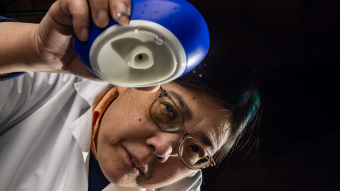January 12, 2021
Contact: Brian Consiglio, 573-882-9144, consigliob@missouri.edu
As a former school nurse in the Columbia Public Schools, Gretchen Carlisle would often interact with students with disabilities who took various medications or had seizures throughout the day. At some schools, the special education teacher would bring in dogs, guinea pigs and fish as a reward for good behavior, and Carlisle noticed what a calming presence the pets seemed to be for the students with disabilities.

Now a research scientist at the MU Research Center for Human-Animal Interaction (ReCHAI) in the MU College of Veterinary Medicine, Carlisle studies the benefits that companion animals can have for families. Although there is plenty of existing research emphasizing the benefits of dogs for children with autism, Carlisle’s newest study has found cats may help increase empathy while decreasing separation anxiety for children with autism. The findings can have beneficial implications for families considering adopting a companion animal for their child.
“Previous research has shown parents of kids with autism are more stressed than parents of kids with any other disability,” Carlisle said. “If a family is considering adopting a companion animal, we want to provide the best evidence-based information possible so they can make an informed decision, and cats might be more beneficial than dogs to some families.”
In the study, families that had children with autism aged 6-14 were recruited through the MU Thompson Center for Autism and Neurodevelopmental Disorders and monitored after adopting a cat into their home. The cats were screened for temperament to ensure they were calm and a good match for the family. Not only did the families report an instant bond between their child with autism and their new cat, but the bond remained strong over the course of time, and the child’s anxiety decreased over time.
“We found the main benefit of these companion animals is their unconditional acceptance,” Carlisle said. “Some children with autism may have sensory issues or be sensitive to loud noises, so a cat may be an appropriate, comforting pet for some families due to their calming presence.”
Helping families make the best choice for their kids has motivated Carlisle’s research with companion animals, and the study’s findings highlight the benefits of human-animal interaction.
“As a former pediatric nurse, I have always strived to help children, and one thing I learned is that you need to involve the parents so they can make informed choices for their children,” Carlisle said. “I see pets as a way to enhance wellness, and it feels gratifying to provide assistance to families that have a lot on their plate.”
“Exploratory study of cat adoption in families of children with autism: Impact on children’s social skills and anxiety” was recently published in the Journal of Pediatric Nursing. Funding for the study was provided by the Human Animal Bond Research Institute and the Winn Feline Foundation.




